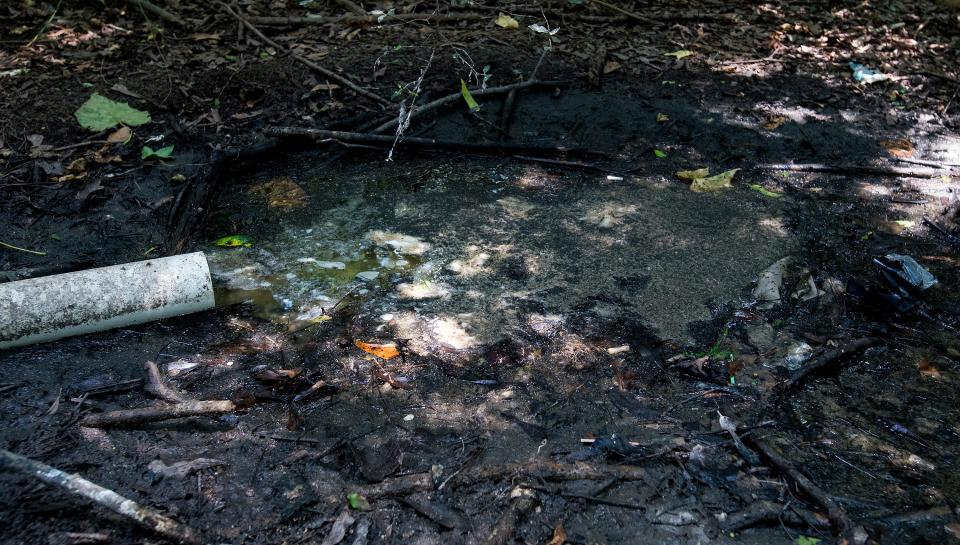The intersection of environmental justice and civil rights: How DOJ investigation could play out
When the U.S. Department of Justice announced its environmental justice investigation in Alabama on Tuesday, Assistant Attorney General Kristen Clarke for the Justice Department's Civil Rights Division called it “historic.”
It's the first time the DOJ has opened a Title IV environmental justice investigation into a recipient of department funding. It will examine whether the public health departments of Alabama and Lowndes County have engaged in “unlawful racial discrimination” against Black residents who make up a vast majority of the county’s population.
Clarke said the departments are “well aware” of the struggles Black residents face in accessing safe wastewater disposal in rural areas, but even if they aren’t aware, the ADPH and Lowndes County Health Department could face consequences.
“If the action has the effect of discriminating and you can show that more people of color are harmed by that, whether or not it was intentional, then that's an adequate allegation of a violation of the Civil Rights Act of 1964,” environmental justice attorney Chandra Taylor said.
Investigation: DOJ opens investigation into Black residents' access to sewage disposal in Lowndes County
How safe is your tap water?: Here are Alabama utilities with the most serious contaminants

This issue of adequate sewage access in Lowndes has been widely reported on, and U.S. Rep. Terri Sewell has even brought potential solutions like the Rural Septic Tank Access Grant of 2018 to Congress. It passed, and millions of dollars have come into the county to help increase access. Still, the problems have not yet been resolved.
“You can go to Wilcox County, and you find exactly the same situation, but really nothing happening to solve the problem,” University of Alabama professor Mark Elliott said. “It's kind of ironic that Lowndes County is the one that has the DOJ action when you can go to any other Black Belt county and find almost nothing being done to solve the problem in very similar conditions.”
Elliott has studied water, sanitation and public health for over a decade, and in recent years, his studies have focused on the Black Belt region of Alabama. The three key factors he has found that contribute to the sewage shortcomings in the Black Belt are high percentages of rural poverty, lack of municipal sewer systems and impermeable soil that causes traditional septic systems to fail.
In a project with UA, Elliott found that over half of the homes in Wilcox County that he sampled in a “site by site” survey had failing septic systems and instead used an illegal method of sewage disposal called straight-piping.
“What are they left with?” he said. “They've got to get wastewater out of their home. They've got to get it off the property, so they'll bury a 4-inch PVC pipe, maybe connected to a 55-gallon drum, maybe to a septic tank, maybe to a buried refrigerator or something to handle the solids, and then just run the liquids out into the woods.”
This method is also used by many residents of rural Lowndes County.
Whether or not straight-piping results in an overwhelming stench just depends on the weather each day, Elliott said.

Sewell represents the 7th congressional district of Alabama, which includes much of the Black Belt, and several other counties in her district could be experiencing similar lack of sewage treatment options.
“This wastewater crisis is an issue of environmental justice, public health and equity. It is exacerbated by systemic disinvestment in rural and underserved communities, especially communities of color like those across the Black Belt,” Sewell said in a statement to the Advertiser. “I welcome the Department of Justice’s investigation into the abhorrent conditions of the wastewater systems that my constituents face in Lowndes County.”
An ADPH official said the department is looking to “have this matter resolved as quickly as possible.”
Taylor, who is with the Southern Environmental Law Center’s Environmental Justice Center, has won several cases aimed at protecting communities in poverty and communities of color from being disproportionately harmed by their environments.
When the DOJ launches such an investigation on administrative complaints, the health departments being investigated typically don't go to court. That happens only if an investigation finds intentional discrimination, Taylor said.
“The most powerful effect that comes out of filing an administrative civil rights complaint is the possibility that the federal funding that the federal aid recipient received would be taken away,” Taylor said. “What is more likely are settlements in a negotiation between the investigating federal agency and the federal aid recipient where they modify their decision-making.”
Hadley Hitson covers the rural South for the Montgomery Advertiser and Report for America. She can be reached at hhitson@gannett.com.
This article originally appeared on Montgomery Advertiser: DOJ investigation into Lowndes County sewer access in Alabama

